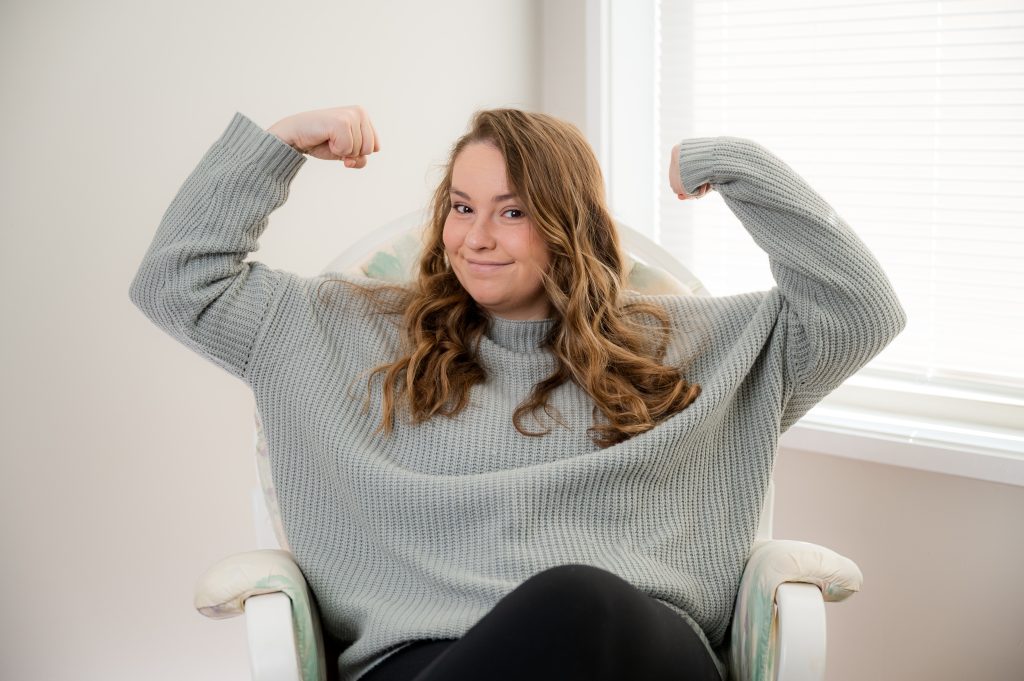Focus on Movement, Not Exercise
Let me ask you something: When you think about going to the gym, do you call that exercise or movement?
One of the things that really changed my relationship with workouts was shifting from thinking in terms of how many times per week I exercised to thinking about how much I moved on any given day. This blog is going to be a little bit more of a heart to heart.
I’m going to talk about 3 reasons that I struggled with exercise frequency in the past, and how shifting to focus on movement not exercise really helped.
I feel your pain
I have a PhD focused on health behavior change. My job is to help people close the gap between knowing what to do and actually doing it. I’m also a person who has experienced that gap.
I grew up having a lot of difficulty self-regulating, controlling my behavior, and moving myself in the direction of my goals. I experienced that struggle. It wasn’t until I got my PhD and started learning the real science that I was able to start applying them in a compassionate, empowering way. I was able to truly transform my own life.
Let’s dig into the shift to focus on movement not exercise. Here’s one of the reasons why that really resonated with me.
Trigger warning: I am going to discuss diet culture and intentional weight loss and my experience with those things. So if you don't want to hear about that, skip this post.
I grew up not very athletic at all. Sports were not my thing. I was totally a bookworm, a nerd. But I remember in fifth grade, wearing baggy shirts to school because I thought that my stomach was too pudgy. I grew up in the nineties, and a lot of us at that time had this thin ideal.
One of the things that I learned very early on was that exercise was a way to lose weight. In college, I would go to the gym and do 45 minutes on the elliptical or 45 minutes on the treadmill. My only concern would be how many calories I burned in that specific workout. I didn’t care about getting faster or stronger. Or heart health or longevity. I literally just cared about weight loss. That created this association in my brain where:
-
- Exercise equals weight loss.
-
- Weight loss equals ‘Karin’s body is bad’,
-
- ‘Karin’s body is bad’ equals shame.
How do you really feel about exercise?
As a result, I had this deep connection between exercise and feelings of shame. I honestly think a lot of us do. That’s why I’m talking about it. Specifically for me, it was that word exercise. Even workouts were connected to that feeling for me.
Shift your focus
Now I have a really healthy empowering relationship with exercise. So how did I make the shift to where I’m at today? One of the things I did was go to therapy for five or six years. If this might be a pattern in your past, you should discuss with a therapist. Secondly in this process of reshaping my relationship with exercise, I shifted my focus on movement not exercise – and counting all forms of movement.
So…
Tidying was movement and walking was movement, and gentle yoga was movement and stretching was movement. And as soon as I focused on incorporating more movement in my life that made an enormous difference. Even if that didn’t mean 45 minutes or getting sweaty or doing an all-out workout at the gym- .
How do you define exercise?
That brings me to point 2. If you are struggling with exercise consistency, I wonder how rigid your definition of exercise is? This was something that even came up for me last year. I was training for a power lifting meet. Basically, I got to the point where I was so burnt out I didn’t want to do another bench press or squat.There was nothing worse I could imagine. And I realized that my definition of exercise or movement had sort of gotten narrowed down.
I had done all this work expanding it and then all of a sudden my brain was only counting it as movement. And movement only counted as a workout if it was a one hour top to bottom power lifting workout.
Expand your definition
So I did 30 days of movement and I temporarily dropped my power lifting goal. I did end up competing at a meet later that year, but for the moment I dropped my goal completely. I just said, Hey, I am going to release all of my specific definitions of what movement looks like. I’m going to count more and more. So if you’re having trouble being a frequent exerciser, first of all join us inside Change Academy this month. We’re going to talk even more about this kind of stuff. But second of all, expand your definition. Work on your cognitive flexibility, and focus on movement not exercise.
How flexible are you?
People are always asking me , Karin, how do I become more flexible? I am an all or nothing thinker. Let me ask you this: How do you become more flexible? You stretch. Stretching mentally looks like… getting yourself to do 30 minutes of gentle stretching,
Your brain is going to put up a huge fight. And trust me, my brain has done this as well. But that is the way we cognitively stress ourselves and become more flexible. We do the thing and we mentally adjust the way we’re thinking about it.
-
- even though your brain protests,
-
- even though you don’t like it,
-
- even though it makes you feel uncomfortable because it’s not hard enough.
Give yourself some grace
That brings me to point number 3. The way I think about exercise and movement now has been really empowering for me. I think about exercise and movement as a trampoline. Not a literal trampoline, but a metaphorical trampoline. A trampoline is able to create movement. It’s able to springboard something because it has a combination of structure and flexibility.
The middle part of it is flexible, which creates that springiness, but the outside of it is structured. So now I tell myself We’re going to do 30 minutes of movement every day. I give myself that structure. But inside of that structure I give myself the flexibility of what that movement looks like, when that movement happens, what counts as that particular type of movement.
And even time – if I start a workout and get 16 minutes in and I’m really done and tired, I give myself the flexibility to stop that workout for the day. That’s the lesson I want to impress upon you. This actually applies to any kind of behavior change that you’re looking for.
Where do you need more structure and where do you need more flexibility?
Share your experience
If you resonated with any of this, I would love to hear about it in the comments. I know that diet culture and early associations with exercise and weight loss are issues for a lot of us. It helps to hear and see other people comment that they have experienced the same thing.
If you want to focus on movement not exercise in your life, but you are looking for an empowering way to learn to do that, number 1:, I highly encourage you to join us this month inside of Change Academy. But number 2: I definitely want you to go watch my videos on workout frequency, and when to work out.
I’ve done several of them this month that will give you some tools and tips and tricks that don’t involve me just screaming at you, Be disciplined, make it a habit, or all the other toxic self health advice that you’ve probably heard out there.




